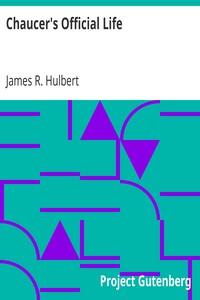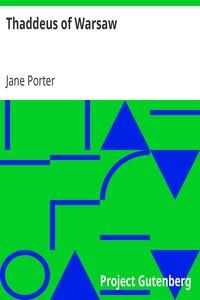|
|
Read this ebook for free! No credit card needed, absolutely nothing to pay.Words: 28819 in 6 pages
This is an ebook sharing website. You can read the uploaded ebooks for free here. No credit cards needed, nothing to pay. If you want to own a digital copy of the ebook, or want to read offline with your favorite ebook-reader, then you can choose to buy and download the ebook.

: Chaucer's Official Life by Hulbert James R James Root - Chaucer Geoffrey -1400; John of Gaunt Duke of Lancaster 1340-1399; Chaucer Geoffrey -1400 Friends and associates; Poets English Middle English 1100-1500 Biography@FreeBooksTue 06 Jun, 2023 INTRODUCTION: Statement of the problem THE ESQUIRES OF THE KING'S HOUSEHOLD: Their Families Appointment Classification Services Rewards Marriage Careers of the Esquires of 1368 THE JUSTICES OF THE PEACE THE CUSTOMS SIR JOHN DE BURLEY SIR EDWARD DE BERKELEY SIR THOMAS DE PERCY SIR WILLIAM DE BEAUCHAMP RICHARD FORESTER HENRY SCOGAN OTO DE GRAUNSON BUKTON CHAUCER'S CAREER AND HIS RELATION TO JOHN OF GAUNT CHAUCER'S RELATION TO RICHARD II SOME GENERAL POINTS INTRODUCTION The researches of Sir Harris Nicolas, Dr. Furnivall, Mr. Selby and others have provided us with a considerable mass of detailed information regarding the life and career of Geoffrey Chaucer. Since the publication of Nicolas's biography of the poet prefixed to the Aldine edition of Chaucer's works in 1845, the old traditional biography of conjecture and inference, based often on mere probability or the contents of works erroneously ascribed to Chaucer, has disappeared and in its place has been developed an accurate biography based on facts. In the sixty-five years since Nicolas's time, however, a second tradition--connected in some way with fact, to be sure--has slowly grown up. Writers on Chaucer's life have not been content merely to state the facts revealed in the records, but, in their eagerness to get closer to Chaucer, have drawn many questionable inferences from those facts. Uncertain as to the exact significance of the various appointments which Chaucer held, his engagement in diplomatic missions and his annuities, biographers have thought it necessary to find an explanation for what they suppose to be remarkable favors, and have assumed--cautiously in the case of careful scholars but boldly in that of popular writers--that Chaucer owed every enhancement of his fortune to his "great patron" John of Gaunt. In greater or less degree this conception appears in every biography since Nicolas. Professor Minto in his Encyclopedia Britannica article says with regard to the year 1386: "that was an unfortunate year for him; his patron, John of Gaunt, lost his ascendancy at court, and a commission which sat to inquire into the abuses of the preceding administration superseded Chaucer in his two comptrollerships. The return of Lancaster to power in 1389 again brightened his prospects; he was appointed clerk of the King's works," etc. Similarly, Dr. Ward in his life of Chaucer, after mentioning that Chaucer and John of Gaunt were of approximately the same age, writes: "Nothing could, accordingly, be more natural than that a more or less intimate relationship should have formed itself between them. This relation, there is reason to believe, afterwards ripened on Chaucer's part into one of distinct political partisanship." With regard to the loss of the controllerships Dr. Ward writes: "The new administration had as usual demanded its victims--and among their number was Chaucer.... The explanation usually given is that he fell as an adherent of John of Gaunt; perhaps a safer way of putting the matter would be to say that John of Gaunt was no longer in England to protect him." A little further on occurs the suggestion that Chaucer may have been removed because of "his previous official connection with Sir Nicholas Brembre, who, besides being hated in the city, had been accused of seeking to compass the deaths of the Duke and of some of his adherents." Later, in connection with a discussion of Chaucer's probable attitude toward Wiclif, Dr. Ward writes: "Moreover, as has been seen, his long connexion with John of Gaunt is a well-established fact; and it has thence been concluded that Chaucer fully shared the opinions and tendencies represented by his patron." Dr. Ward's treatment is cautious and careful compared to that of Prof. Henry Morley in his "English Writers." For example, the latter writes: "Lionel lived till 1368, but we shall find that in and after 1358 Chaucer's relations are with John of Gaunt, and the entries in the household of the Countess Elizabeth might imply no more than that Chaucer, page to John of Gaunt, was detached for service of the Countess upon her coming to London." A few pages further on in the same volume occurs a paragraph on the life of John of Gaunt glossed "Chaucer's Patron." With regard to the grants of a pitcher of wine daily, and the two controllerships, Professor Morley writes: "These successive gifts Chaucer owed to John of Gaunt, who, in this last period of his father's reign, took active part in the administration." And again, "John of Gaunt had administered affairs of government. It was he, therefore, who had so freely used the power of the crown to bestow marks of favour upon Chaucer." "It was his patron the Duke, therefore, who, towards the end of 1376, joined Chaucer with Sir John Burley, in some secret service of which the nature is not known." Finally, after mentioning Chaucer's being "discharged" from his controllerships, Morley writes: "During all this time Chaucer's patron John of Gaunt was away with an army in Portugal." Such absolute certainty and boldness of statement as Professor Morley's is scarcely found again in reputable writers on Chaucer. Professor Lounsbury in his life of Chaucer implies rather cautiously that Chaucer lost his places in the Customs because of John of Gaunt's absence from the country, and as the result of an investigation of the customs. Mr. Jusserand in his Literary History of England writes: "For having remained faithful to his protectors, the King and John of Gaunt, Chaucer, was looked upon with ill favour by the men then in power, of whom Gloucester was the head, lost his places and fell into want." F. J. Snell in his Age of Chaucer has similar statements, almost as bold as those of Professor Morley. "John of Gaunt was the poet's life-long friend and patron." "Chaucer was now an established favourite of John of Gaunt, through whose influence apparently he was accorded this desirable post" Most remarkable of all: "Outwardly, much depended on the ascendancy of John of Lancaster. If the Duke of Lancaster prospered, Chaucer prospered with him. When the Duke of Gloucester was uppermost, the poet's sky was over cast, and he had hard work to keep himself afloat." The last quotations which I shall give on this point are from Skeat's life of Chaucer prefixed to the single volume edition of the poet's works in the Oxford series: "As the duke of Gloucester was ill disposed towards his brother John, it is probable that we can thus account for the fact that, in December of this year, Chaucer was dismissed from both his offices, of Comptroller of Wool and Comptroller of Petty Customs, others being appointed in his place. This sudden and great loss reduced the poet from comparative wealth to poverty; he was compelled to raise money upon his pensions, which were assigned to John Scalby on May 1, 1388." On the same page: "1389. On May 3, Richard II suddenly took the government into his own hands. John of Gaunt returned to England soon afterwards, and effected an outward reconciliation between the King and the Duke of Gloucester. The Lancastrian party was now once more in power, and Chaucer was appointed Clerk of the King's Works," etc. THE ESQUIRES OF THE KING'S HOUSEHOLD THEIR FAMILIES We have the names of the esquires of the king's household in two lists of 1368 and 1369, printed in the Chaucer Life Records . In the study of the careers of these esquires the most difficult problem is to determine the families from which they were derived. Had they come from great families, of course, it would not have been hard to trace their pedigrees. But a long search through county histories and books of genealogy, has revealed the families of only a few, and those few in every case come from an unimportant line. It is clear then that they never were representatives of highly important families. A statement of the antecedents of such esquires as I have been able to trace, the names arranged in alphabetical order, follows. John Beauchamp was almost certainly either that John Beauchamp of Holt who was executed in 1386, or his son. In either case he was descended from a younger branch of the Beauchamps of Warwick. Free books android app tbrJar TBR JAR Read Free books online gutenberg More posts by @FreeBooks
: Frederick Douglass on Reconstruction by Douglass Frederick - Reconstruction (U.S. history 1865-1877) African American Writers@FreeBooksTue 06 Jun, 2023

: Aaron's Rod by Lawrence D H David Herbert - Adultery Fiction; London (England) Fiction; Picaresque literature; Male friendship Fiction; Florence (Italy) Fiction; Runaway husbands Fiction; Bohemianism Fiction@FreeBooksTue 06 Jun, 2023
|
Terms of Use Stock Market News! © gutenberg.org.in2025 All Rights reserved.






